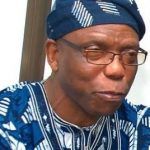The Executive Secretary of the National Universities Commission (NUC), Prof. Julius Okojie, has described
education as the strongest tool for national development.

Delivering a paper titled, ‘‘Capacity Development Issues in Nigeria’s Tertiary Institutions’’, at an interactive session with Senior Executive Course 37 of the National Institute for Policy and Strategic Studies (NIPSS), Kuru, Plateau State, with the theme “Repositioning Nigeria’s Educational System for Global Competitiveness”.
Professor Okojie disclosed that various strategies were being employed by Government to strengthen the capabilities, skills, personal and collective competencies of staff and students in tertiary institutions, adding that the strategies could be categorised into two broad categories: Human Capacity Development and Capital Capacity Development.
He explained that Human Capacity Development in the Nigerian tertiary institutions encompassed the intellectual, moral and perceptive capabilities of staff and students.
The NUC Scribe stated that, as a regulatory body, the Commission recently re-strategized, with the creation of the Department of Quality Assurance (DQA) as part of the efforts to evolve theframeworks for human capacity development in the universities.
He added that regular monitoring and all-encompassing institutional accreditation of courses and facilities, as well as resource verification, were the operative instruments of the Commission.
Professor Okojie said that the monitoring of carrying capacity for each university was to ensure that available pedagogy resources were not diluted or over-stretched by uncontrolled student population increase, noting that based on the national man-power needs and prevailing government policies, the maximum student number admitted by each university, annually, was indicated by the Joint Admissions and Matriculation Board (JAMB), with the close scrutiny of the Commission.
The Executive Secretary reaffirmed that NUC was determined, more than ever, to ensure that human capital investment was sustained in all universities, so as to compare favourably with contemporary tertiary institutions, globally.
education as the strongest tool for national development.

Delivering a paper titled, ‘‘Capacity Development Issues in Nigeria’s Tertiary Institutions’’, at an interactive session with Senior Executive Course 37 of the National Institute for Policy and Strategic Studies (NIPSS), Kuru, Plateau State, with the theme “Repositioning Nigeria’s Educational System for Global Competitiveness”.
Professor Okojie disclosed that various strategies were being employed by Government to strengthen the capabilities, skills, personal and collective competencies of staff and students in tertiary institutions, adding that the strategies could be categorised into two broad categories: Human Capacity Development and Capital Capacity Development.
He explained that Human Capacity Development in the Nigerian tertiary institutions encompassed the intellectual, moral and perceptive capabilities of staff and students.
The NUC Scribe stated that, as a regulatory body, the Commission recently re-strategized, with the creation of the Department of Quality Assurance (DQA) as part of the efforts to evolve theframeworks for human capacity development in the universities.
He added that regular monitoring and all-encompassing institutional accreditation of courses and facilities, as well as resource verification, were the operative instruments of the Commission.
Professor Okojie said that the monitoring of carrying capacity for each university was to ensure that available pedagogy resources were not diluted or over-stretched by uncontrolled student population increase, noting that based on the national man-power needs and prevailing government policies, the maximum student number admitted by each university, annually, was indicated by the Joint Admissions and Matriculation Board (JAMB), with the close scrutiny of the Commission.
The Executive Secretary reaffirmed that NUC was determined, more than ever, to ensure that human capital investment was sustained in all universities, so as to compare favourably with contemporary tertiary institutions, globally.

No comments:
Post a Comment